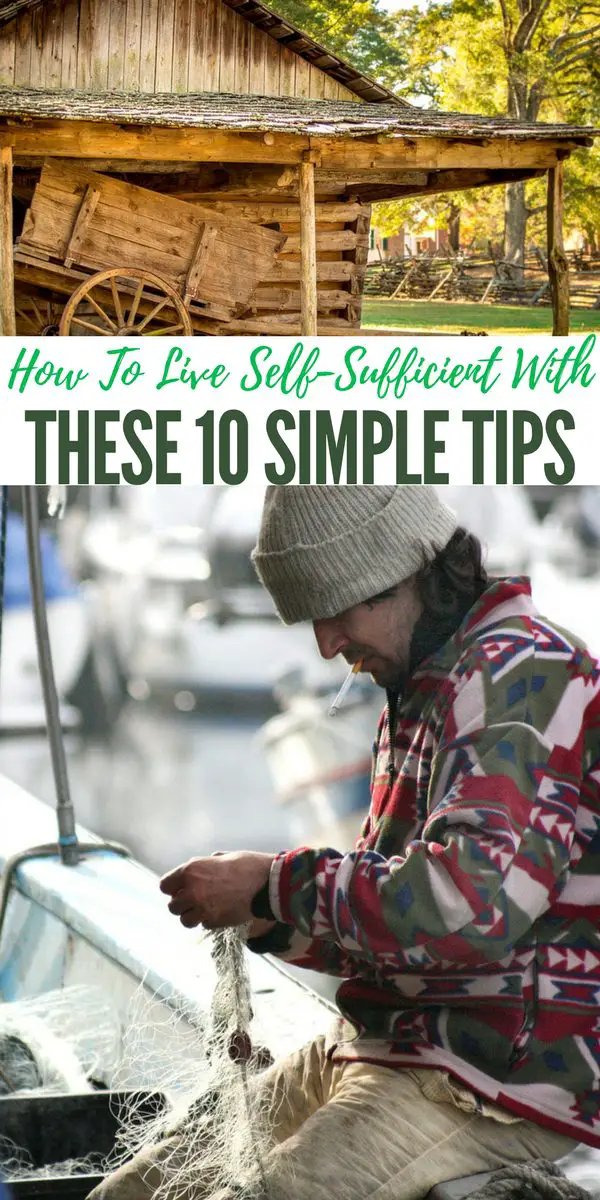Have you ever wondered about what it would be like if you were to live a self-sufficient life? Out on a farm where your neighbors are miles away and you owned at least an acre.
As opposed to living in the middle of a bustling city with a department store just a few minutes away?

To some, the idea is nothing short of weird. The homesteading lifestyle isn’t something that appeals to everyone.
However, some people are more inclined towards the idea of a sustainable rural life. And after you read this, no matter if you live in a big city or the middle of nowhere, you can take part in this lifestyle.
10 Simple Tips To Live a Self-Sufficient Life
Now, you may have never heard of homesteading. The basis of homesteading is to live a self-sufficient lifestyle, comparable to the life of a farmer.
That might sound like a difficult thing to maintain. However, by using the following ten tips to guide you, you may find that it is much easier than you think.
Take into account that not everyone will accept your lifestyle
Most people don’t completely agree with a lifestyle that isn’t their own to begin with. But a big part of building relationships and life, in general, is accepting others and respecting that they do things in their own way.
Not everyone will do this. Therefore, understanding beforehand that this change in your lifestyle may be the cause of judgment is important. Just remember not to let it affect you negatively and keep on doing what you want to do – it is your life!
Take a look at your budget
Transitioning into homesteading might not have to be super expensive, but it’s not free either.
Knowing how much you have to spend and sticking to it will ensure that you can safely start changing habits.
As a result, avoiding running low on funds and possibly not being able to pay important bills. Cutting out unnecessary extras can also aid in not only this, but bringing extra cash into your pocket for other necessities.
Begin the process of gardening, hunting, and fishing
Growing your own food is one of the primary components of homesteading. What better way to live a self-sufficient life than to be able to feed yourself from your own garden!?
If you don’t have a suitable area for gardening, take out flowers or use a small section of grass. Fishing and hunting cannot be done just anywhere, but there are typically places in every state for you to take part in both activities.
Be frugal
Spending money wisely can be difficult for some people. Not just because they are frivolous spenders, but because sometimes you just get stuck in a binge shopping trance and – poof! Your extra money has all been spent.
A good way to aid you to live in a self-sufficient manner is to appreciate what you have. Don’t feel the need to buy up everything new.
That’s not to say that a treat every now and again isn’t in order. But spending money on simply necessary items can leave you with much more than you probably thought was possible.
Start raising farm animals
Although most people probably couldn’t imagine sticking a horse and a few cows in their backyard while living in the city, there are permits that you can get for smaller animals such as goats, rabbits, and chickens that can then be used for food and show.
Find ways to save on using electricity
Instead of turning on artificial lights, open up some blinds. Stockpile wood and make a fire if you have a fireplace, which can be handy especially if there is a power outage. You could even invest in a generator if the other options aren’t for you.
There are many ways you can save energy and money at home.
Use fewer paper products
Buying paper towels, tissues, and more can get pricey. Replace these money-consuming items with cloth, towels, or rags. They last much longer and will save up some cash to be used elsewhere.
Buy seeds once and reuse them every year
When you start your garden, use heirloom seeds. Instead of purchasing new seeds every time you plant, you can use the new ones produced by the original seeds.
Raise honey bees
Raising honey bees, and making honey, can be a rewarding and potentially profitable enterprise!
Honey is not only tasty but also marketable. Not to mention the fact that it is an all-natural sweetener that can be mixed with teas and coffees.
Honey is a great tool for bartering as well! As you can see, I am a fan of honey. ?
Growing herbs can serve several purposes, including medicinal ones
Herbs are easy to grow and have been used in the past to cure ailments. Using herbs is another all-natural way to keep you healthy instead of purchasing drugstore medicines.
Conclusion
Whether or not you convert your lifestyle completely this way, using some of the above tips can be both healthy and money-saving for you and your family.
Take it one step at a time, and soon enough you’ll be able to boast that the salad you just made didn’t come from a package at the store — it was completely homemade, didn’t cost a cent, and is healthy too!
